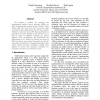Free Online Productivity Tools
i2Speak
i2Symbol
i2OCR
iTex2Img
iWeb2Print
iWeb2Shot
i2Type
iPdf2Split
iPdf2Merge
i2Bopomofo
i2Arabic
i2Style
i2Image
i2PDF
iLatex2Rtf
Sci2ools
EH
2005
IEEE
2005
IEEE
Hardware Evolution of Analog Circuits for In-situ Robotic Fault-Recovery
We present a method for evolving and implementing artificial neural networks (ANNs) on Field Programmable Analog Arrays (FPAAs). These FPAAs offer the small size and low power usage desirable for space applications. We use two cascaded FPAAs to create a two layer ANN. Then, starting from a population of random settings for the network, we are able to evolve an effective controller for several different robot morphologies. We demonstrate the effectiveness of our method by evolving two types of ANN controllers: one for biped locomotion and one for restoration of mobility to a damaged quadruped. Both robots exhibit non-linear properties, making them difficult to control. All candidate controllers are evaluated in hardware; no simulation is used.
| Added | 24 Jun 2010 |
| Updated | 24 Jun 2010 |
| Type | Conference |
| Year | 2005 |
| Where | EH |
| Authors | Dmitry Berenson, Nicolás S. Estévez, Hod Lipson |
Comments (0)

